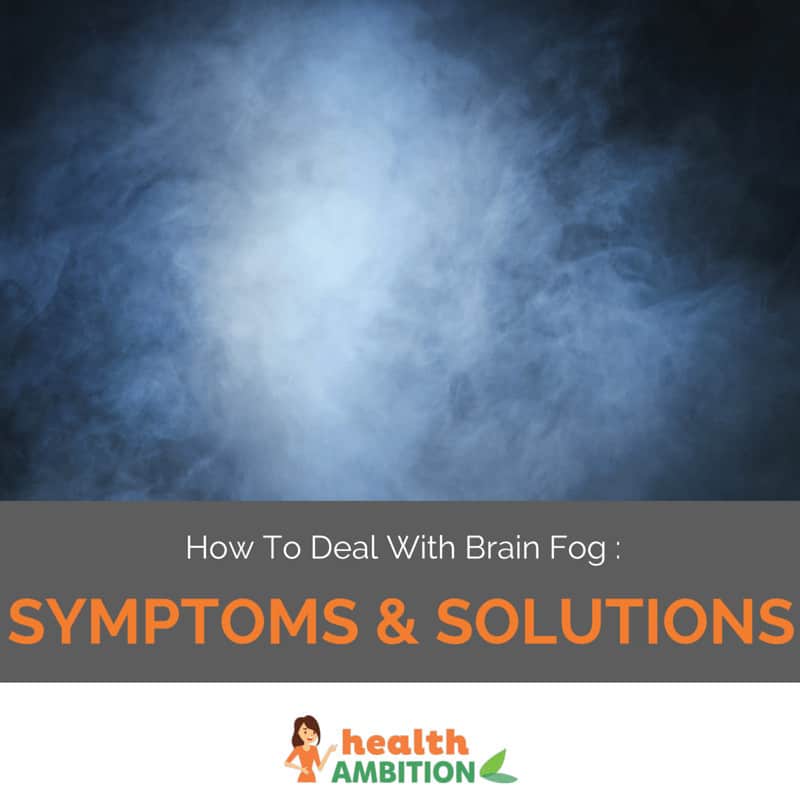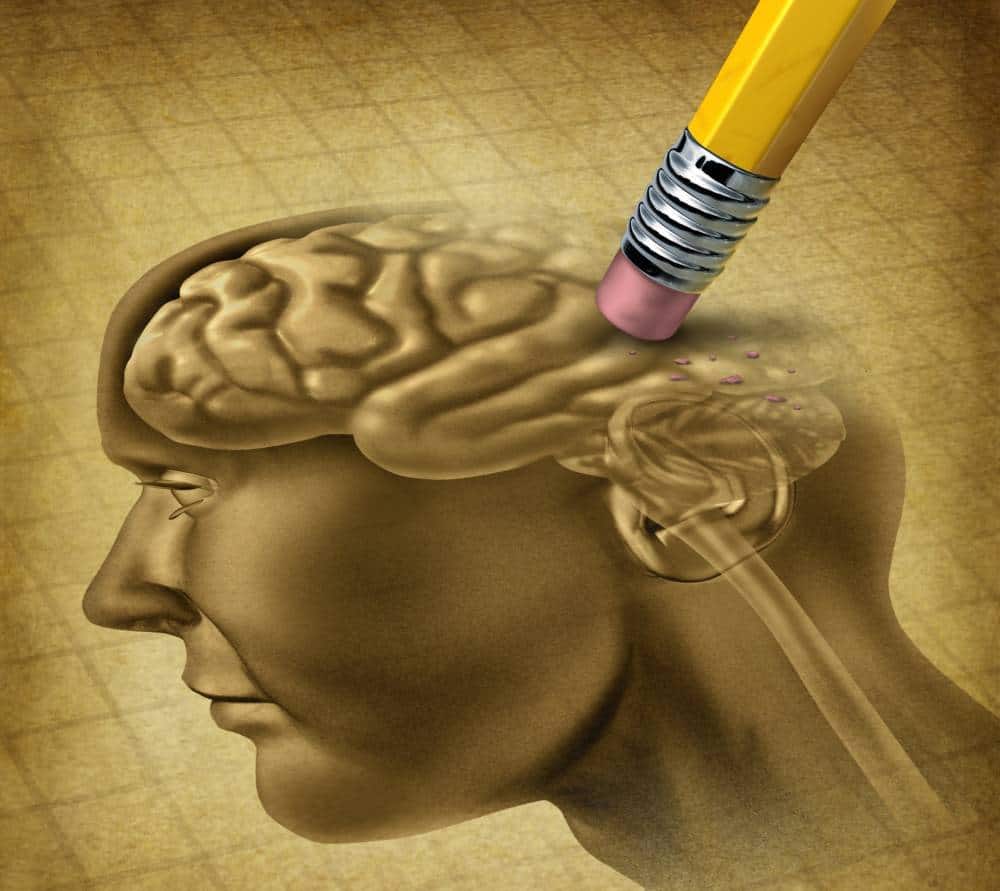
Do you ever feel like your brain just isn’t working? Your mind is foggy, your reactions are slow, and your problem-solving and decision-making skills feel null and void.
Learning something new or concentrating on previously easy tasks seems difficult. It feels like your brain isn’t co-operating with you.
You’ve likely felt this before. Maybe you are feeling this way right now and that’s how you stumbled upon this page.
You can rest easy knowing that you are not alone. This feeling of disconnection or haziness in the brain is often referred to as “brain fog.”

Brain fog can often make you feel like something is wrong with you.
Why do I keep forgetting things? Why is it so hard to focus on a simple task? Why does my brain feel foggy and disconnected?
Recall and processing thoughts feels like a chore. Your to-do list seems insurmountable and forgetting your keys or where you parked your car is quite normal.
So how do you deal with brain fog? What are the symptoms? Why is it happening to you? And more importantly, what are the solutions to brain fog?
How do we get you back to a place of clear-headedness, sharp focus, motivation and improved brain function?
You might be surprised at the simple causes of this unwanted feeling and be even more surprised at the simple solutions. So let’s start at the beginning.
What is Brain Fog?
Brain fog is non-medical term used to describe symptoms that appear when the brain is not functioning at its full potential. There can be several different causes for brain fog. The symptoms are numerous, but luckily for us, the solutions are numerous too.
Most of the time, brain fog can be completely overcome by making some minor but conscious changes in your life.

Of course I need to warn that you should always consult with your physician before self-diagnosing, as a doctor is the best person to decide on the underlying causes of your specific situation.
What are the Symptoms of Brain Fog?
According to the Anxiety Centre, the symptoms of brain fog include things like:
- Difficulty thinking, concentrating or forming thoughts
- Feeling foggy-headed or “cloudy”
- Having illusive thoughts. Information you once recalled easily now slips from your brain
- Feeling more forgetful
- Difficulty focusing and carrying on conversations
- A feeling of disconnection in your brain
9 Solutions to Clear Up Brain Fog
1. Get Adequate Sleep
As I’m sure you know, getting enough sleep is integral as a human being. Unfortunately we humans tend to skimp on sleep in order to get other things done.
Maybe you often skip sleep for social events, or to get in extra hours of work or because you get sucked into a Netflix marathon that finds you groggy-eyed at 3am on a work night (I’m guilty of all of these).

No matter what the reason, lack of sleep can have a significant effect on your brain and the way it functions.
This article on WebMD gives amazing insight into the effects your brain experiences when you don’t catch enough Zs. Not getting enough sleep impairs your cognitive abilities and has a negative effect on your mental health.
Lack of sleep is known to affect your judgment, make you unable to concentrate and cause your attention span and alertness to decrease. On top of this, your memory is reduced.
According to Avelino Verceles, MD and assistant professor at the University of Maryland, “sleep embeds the things that we have learned and experienced over the course of the day into our short-term memory.” When that cycle is interrupted, your memory is at risk.
So next time you go to hit play on the 10th episode of your favorite Netflix show, put the remote down and get some sleep. Your brain will thank you!
2. Develop a Daily Exercise Routine
If you already aren’t getting enough sleep, exercise might seem like the last thing you want to do. However exercise is another integral piece of the healthy brain puzzle.

People who are physically active tend to sleep better, generally have better moods and are able to deal with stress better.
Exercise is also known to increase the happy chemicals in your brain. While exercising your endorphin levels rise and often induce a happy mood.
According to WebMD, in addition to reducing stress, improving sleep and increasing energy, exercise also lowers blood pressure, strengthens and builds bones and reduces body fat. It’s win-win!
3. Modify Your Diet
Sugar is a major culprit when it comes to brain function, mood, and general well-being. Sugar acts like cocaine in the body and the brain.
This study found that sugar is actually 8 times more addictive than cocaine! Scary, right?
Why is Sugar So Addicting….And What Does That Have To Do With Brain Fog?
Well, when you ingest sugar, your blood sugar levels, also known as glucose levels, quickly skyrocket. Then, almost as quickly as they go up, they come crashing down.
In turn you crave more sugar so your blood sugar can skyrocket again.
For a more in-depth look at how sugar affects your brain, check out the following video:
Why does this vicious sugar cycle matter? Well Dr Li-Ng, an Endocrinologist at the Cleveland Clinic, points out that high blood sugar has several consequences, some of which are fatigue and blurry vision.
Sounds a lot like symptoms of “brain fog” to me!
There is another end to the spectrum as well – your blood sugar can also get too low. Low blood sugar also has its side effects, such as feeling dizzy, weak, irritable and off-balance or uncoordinated.
According to Be Brain Fit, “low brain glucose leads to brain fog, mood swings, irritability, tiredness, mental confusion, and impaired judgment.” Sound familiar? Again, brain fog!
How to Combat the Effects of Sugar
Choosing foods that raise your blood sugar slowly is important. To help make these choices it helps to understand the glycemic index of foods. This is a rating given to foods that tells you how quickly that food will spike your blood sugar.
Foods with a low glycemic index enter your bloodstream slowly and efficiently. A high glycemic index puts you in danger of the rapid, unwanted sugar spike I talked about.

Eating healthy foods that are low on the glycemic scale will help keep your blood sugar at moderate levels. You’ll have it there to be used if needed for physical activity but you will not overload your system so much that your insulin doesn’t have time to process it properly.
The folks at Everyday Health explain some easy ways to keep your blood sugar steady. First, you want to make sure you don’t skip any meals. Always plan to have at least 3 meals and 2 snacks each day.
You also want to plan ahead. Keeping healthy snacks like fruit or nuts on hand in your backpack or car can ensure you don’t make a last-minute, unhealthy decision.
Avoid Low-Fat Diets
Dr. David Perlmutter, neurologist and author of the NY Times bestseller Grain Brain, considers fat to be “super fuel” for the brain.
Now don’t get too excited, I’m not talking about the greasy, seemingly-delicious fat that drips of your favorite fast food burger and french fries.

What I’m talking about is good fat; fat that comes from things like olive oil, avocado, coconut oil, nuts, salmon, eggs and grass-fed beef.
These types of healthy fats are necessary components of our happiness hormones: serotonin, dopamine and cortisol. Good fats also help fight inflammation. Inflammation is believed to be a major cause of brain fog.
Inflammation can be caused by injury, illness, stress, poor gut function, or poor diet. Why does inflammation matter when it comes to brain fog? Inflammation causes the neurons in your brain to react more slowly than usual.
This of course slows down your response times, memory and ability to concentrate.
In the following video, Dr. Justin Marchegiani gives an in-depth look into brain fog and inflammation:
Want to know my favorite tip for accomplishing this? Never shop in the center aisles of the grocery store.
Keep yourself and your shopping cart around the perimeter where you’ll find fresh produce and seafood. Only sneak into the center for your healthy oils like coconut oil and olive oil.
4. Keep Your Senses Calm
Overstimulation can be a major contributor to brain fog as well. If too many senses are too heightened for too long, the brain gets overloaded and shuts down. In order to combat this, make sure your work or play space are calm and inviting.
Clear your space of clutter. Reduce loud noise by turning off the radio or TV and closing the windows if you live near high-trafficked areas. Choose calming light bulbs for your lamps and try to eliminate any fluorescent or flashy lights from your space.

You can also Zen your space with candles, essential oil diffusers, and fresh air. When you allow inviting scents like lavender or peppermint into your space, your brain reacts peacefully.
5. Avoid Worry and Trauma
Another way to keep your brain fog to a minimum is by avoiding drama and trauma. Of course sometimes this isn’t possible but you can do your best to eliminate unnecessary stress.
Avoid the people, places and situations that bring up fear, anxiety and sadness in your life. Surround yourself with people who support you, lift you up and inspire you.
People aside, you can eliminate your own worry with the art of meditation or by practicing yoga.

Meditation can be intimidating if you’ve never done it before but by simply taking a few moments each morning or night to sit in silence, clear your thoughts and focus on the present moment you are setting yourself up for a lifetime of success and focus.
This daily clearing of your mind and spirit will reap you great rewards when it comes to mental clarity and awareness. Brain fog will most definitely be a thing of the past.
6. Talk to Someone
Sometimes all it takes to clear your mind is speaking your mind. Talking in confidence to someone can ease anxiety, fear and worry instantly.
Things that seem overwhelming or impossible often lessen when we speak with a friend, family member, significant other or a licensed physician.

These days you can also get access to licensed practitioners online. Clearing your mind is literally at your fingertips.
Sometimes the “fog” you are feeling could be the result of mixed and jumbled emotions that you just need to sort out, out loud. You may find yourself breathing a sigh of relief before you know it.
7. Avoid Multi-Tasking
Multi-tasking can bring on feelings of fear, anxiety and stress. In this day and age it is incredibly hard to do just one thing at a time. Technology and accessibility makes it so easy for us to do multiple things at one time.
Where does that get us though? Nowhere…Fast.
Multi-tasking forces your brain to think about too many different things at once. With thoughts firing all over the place it’s extremely easy to lose focus, concentration and more detrimentally, lose track of important things.
8. Avoid Alcohol and Drugs
Alcohol is a major depressant that slows the function of the central nervous system.

You get a major hit of relief and a period of calmness when you first partake, making your brain and body think everything is amazing but that quickly goes away and you’re left with feelings of guilt, anxiety, hopelessness and confusion.
Alcohol causes restless sleep, decreases motor abilities and delays concentration and focus. If you are imbibing a bit too much, it could be the cause of your brain fog.
Try abstaining from alcohol for 2-4 weeks and see if conditions improve!
9. Predict and Conquer
In my opinion, the key to success in any aspect of your life is preparation. If you fail to prepare, you prepare to fail.
That is the case with dieting, exercise, education, your career and so on. If you already know that you are less clear-headed after a night of drinking or after a lack of sleep, plan ahead.
Don’t allow yourself to make those mistakes when you have important things going on at work or school or at home. Set your intentions before you go into the week.
Promise yourself a good diet, adequate rest, moderate exercise. With those intentions in place and carried through your week, your chances of a foggy brain should decrease drastically.
Wrapping Up
As you can see, brain fog has several symptoms and potential solutions. While inflammation and poor diet are likely the major players in brain fog, there are also several other potential causes out there.
The best thing you can do is talk to your physician to find out the reason for and solution to your specific situation. A good place to start in the meantime would be to sit down and do a personal stock take on your daily routine and habits.
Monitor your activities, diet and mood over the next couple weeks and see if you start to notice any patterns.
Plan for proper sleep, nutrition and abstinence from alcohol and drugs and see if that makes a difference in your mental clarity.
If you continue to feel foggy, make sure you get with your physician right away to continue the investigation.
Have you personally found anything exceptionally useful in clearing brain fog? Please share in the comments!
Sources: 1, 2, 3, 4, 5, 6, 7, 8, 9, 10, 11, 12, 13
Leave a comment